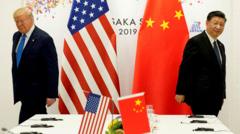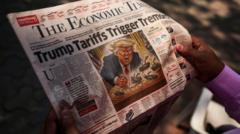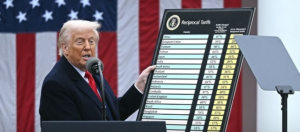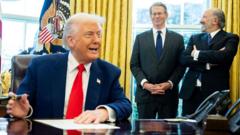The ongoing tariff battle between the US and China continues to intensify, with both countries showing no signs of backing down, creating significant uncertainty in the global economy.
China and the US in Escalating Tariff Crisis: No Signs of Compromise

China and the US in Escalating Tariff Crisis: No Signs of Compromise
Tensions rise as both nations dig in their heels over trade tariffs, impacting global markets.
In a heightening trade conflict, the United States and China are increasingly at odds over tariffs, with no compromise in sight. A recent decision by the Chinese government imposed a staggering 34% tariff on all US goods flowing into the country, a move that especially devastates American agricultural producers already facing an uphill battle from previous tariffs. This significant increase is expected to exclude many US products from entering the crucial Chinese market.
Beijing appears unconcerned about sourcing alternatives for commodities like chicken, pork, and sorghum, emphasizing that moving away from US goods may have strategic implications as it undermines President Trump’s political base. Analysts worldwide are beginning to worry about the cascading effects on supply chains, which, due to globalization, could drastically disrupt international trade.
The lack of signs indicating a willingness to reach a settlement is troubling. The timing of the Chinese announcement regarding “resolute countermeasures” to Trump’s tariffs seems intentional; made during a public holiday late in the day, it suggests a desire to manage the domestic narrative carefully or a resignation to escalating hostilities.
President Xi Jinping’s apparent nonchalance amid such high-stakes developments—during the tariffs announcement, he was engaged in a tree-planting initiative—symbolizes a confident stance against US expectations, further hinting at China's resolve to navigate the international landscape on its own terms.
Should this rift continue to widen, it could pave the way for China to expand its trade relations with other nations, including those that have been historically aligned with the US. Such shifts would not only harm American businesses but ultimately lead to increased costs for American consumers already bracing for the financial fallout from tariffs.
The reality is stark: if negotiations do not find a way forward soon, both economies—and the global market—could suffer dire consequences.























